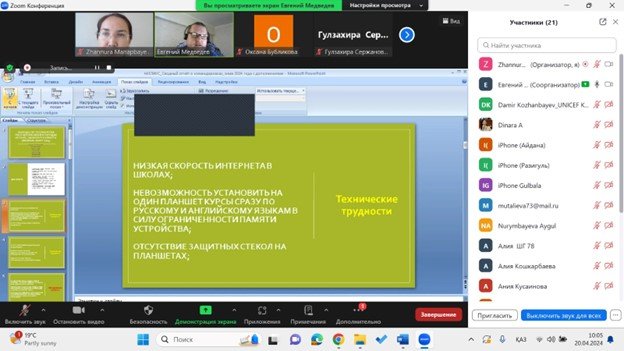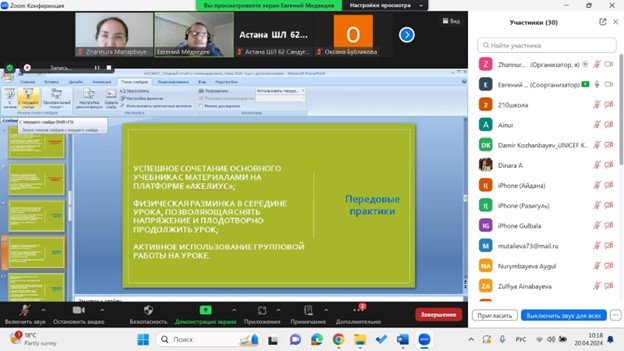Candidate of Philological Sciences, Assistant Professor Yevgeniy Medvedev briefed the discussion participants on the primary goals of their visits to schools involved in the Akelius project. The main objectives were:
- Establishing connections with schools, administrations, and Russian and English language teachers.
- Discussing the project's progress, objectives, current results, and any difficulties encountered.
- Conducting an electronic survey among teachers regarding the Akelius project.
- Assessing students' knowledge related to the project through paper-based evaluations conducted by the teachers.
- Providing in-person methodological and technical advice.
- Discussing classroom management and the organization of the digital learning environment.
- Planning online training sessions, including topics and dates.
- Presenting methodological materials to support the project's effective implementation.
- Working on improving the course offered on the Akelius platform.
- Awarding certificates for completed training sessions.
"During our school visits, we encountered several technical difficulties," said Yevgeniy Yuryevich. "These included low internet speeds in the schools, the inability to install both English and Russian courses on a single tablet due to limited device memory, and the lack of protective glass on the tablets."
Project coordinator and head of the Department of Languages at JSC IITU, PhD Zhannura Manapbayeva, also shared her perspective on the technical difficulties encountered. "I would also highlight the following technical issues we faced during our school visits: a lack of adapters for recharging, insufficient tablets and headphones in some classes, and unclear organization of the digital environment," concluded Zhannura Zharkanbekovna.

Associate Professor of the Department of Languages, Dinara Aliyeva, highlighted the methodological preparedness of the schools and the professional readiness of their teachers. According to her, some lessons lacked a clear structure and smooth transitions between activities. She also noted that not all teachers fully understood the essence of the project, leading to difficulties in integrating "Akelius" into the lesson structure. Additionally, there was an excessive reliance on the Akelius platform, with students spending the entire 40-minute lesson working only on their tablets.
Ainur Zhumanovna also shared her observations, noting the following: “We encountered methodological difficulties such as an insufficient number or complete absence of tasks for developing writing skills, and some teachers' misunderstanding of blended learning. Children are divided into groups using the 'Station Rotation' technology, but they end up doing the same tasks.”
Associate Professor of the Department of Languages, Oksana Bublikova, added that teachers often involved only individual, typically strong, students during lessons. In some classes, the lesson goal was not stated, making it unclear what students were expected to achieve. Additionally, there was often no connection made between the current topic and previous topics, leading to a fragmented understanding of the material. She also mentioned that tablet-based classes were conducted as an addition to the main schedule, which is not required by the project. Particularly concerning were instances of class cancellations immediately before the experts' visits.
“It is worth noting that during our school visits, we also observed several best practices,” said Yevgeniy Yuryevich. “These included a creative approach in the motivational part of the lesson and in organizing feedback at the end, such as assessing student work. We saw active use of interactive whiteboards, including for working with Akelius when tablets were absent or malfunctioning. I also appreciated the use of gaming techniques in the classroom.”

According to Zulfiya Makhsutovna, some lessons stood out as exemplary, featuring a clear structure, comprehensive coverage of all types of speech activities, and optimal task proportions. Akelius was seamlessly integrated into these lessons as a tool for practicing the material being studied, effectively combining the main textbook with Akelius platform materials.
"The fact that some schools demonstrated good (and even exemplary!) lessons suggests that the project is moving in the right direction," noted Oksana Vasilievna. "It's worth noting that teachers found Akelius particularly productive for working with children with special educational needs."
Dinara Assylkhanovna shared important insights, noting that unsuccessful lessons often indicated a lack of understanding of the project's essence among teachers. She emphasized the need to continuously focus on the role tablets can and should play in the classroom.
Zhannura Zharkanbekovna also offered her insights, highlighting a common misconception among some teachers regarding Akelius. "Some teachers perceive Akelius as a standalone program, separate from the main school curriculum, and believe it needs to be inserted between regular classes," she noted. "However, Akelius is not meant to run parallel to the standard curriculum. Instead, it should be viewed as a tool for additional practice of lexical and grammatical topics outlined in the state curriculum."
IITU language experts provided several recommendations to enhance the utilization of the Akelius. Ainur Zhumanovna suggested, "Given the challenges teachers face in attending each other’s lessons due to scheduling conflicts and distant school locations, it may be beneficial to videotape the lessons of exemplary teachers. This way, those struggling to organize tablet-based lessons can better understand effective methodologies by observing these recordings."
Language experts emphasized the importance for teachers to persist in attending trainings offered as part of the project and to confidently implement the methods taught in their classrooms. They also suggested conducting these trainings offline for enhanced engagement. Furthermore, the experts recommended that the developers of the Akelius platform consider incorporating editing functionality, enabling teachers to self-publish the materials they require.
